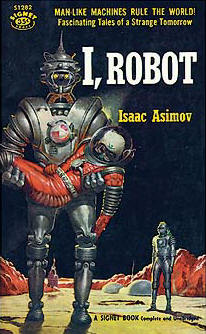|
A retro cover of I, Robot depicting a scene from one of the stories within. Isaac Asimov is a famous mid-twentieth-century scifi writer of both novels and short stories. Aside from I, Robot, his most famous work is the Foundation series (which won the one-time Best All Time Series Hugo Award in 1966, kind of a big deal). He won many awards, and now some awards, magazines, and even robots are named for him. Most of his work includes robotics, and his three laws of robotics have been at the very least considered if not adapted by many who include robots in their own writing. If you're writing robots, cyborgs, or even AI in your scifi, you need to read iRobot. Plus, it's got some thriller and horror elements, and robots fit the Halloween vibe, right? So it's the perfect time to read it.
1) Just like Frankenstein, don't be afraid of a unique structure I, Robot, as it sits on a shelf today, is not how the contents were first presented. Now, it's a series of stories with an external story woven through that connected them all. Initially, these stories were published solo from 1940-1950. If all of the stories had been presented in chronological order with no external structure to guide me, I would have thought this was very choppy and didn't flow. The structure being handed to me up front made it easier to understand these were short stories stacked on each other in a trench coat. It may be a challenge to put together, but a unique structure could be just what your complex novel needs. 2) Play with your worldbuilding Each of the short stories delved into a different aspect of how the laws of robotics worked, or could inadvertently fail, and also included what was going on socially with how the world viewed robots. It was a really cool way to see how this world functioned and it was fun guessing at how the three laws of robotics would get messed up in each tale. If your story world has set laws (socially or physically), see how those laws interact, if they can fail, or if they can bend. Maybe your characters don't even understand the laws fully, so what they consider a rule is actually much more complex. Feel free to play and even write short stories about your world to get to know it more deeply. 3) Anticipate future social norms One thing I appreciated about I, Robot was that the main character, the robopsychologist being interviewed in the external structural storyline, was a woman. This was put together in 1950, and that character appears in the short stories too, so she wasn't just slapped in there for fun. While she was the only woman prominently featured as a scientist, she was so necessary. If I'd read this book and it had been all men in science despite the mid-to-late 2000s setting, I wouldn't have enjoyed it. If your writing is set in the future, think about how it will read in the future. Will that joke you made still be funny, or could it be harmful? (The gauge here is to "punch up, not down" i.e. make fun of the powerful not the people with equal or less power than you. Satire about the president: will probably age well; joke about the poor: no.) Will your inclusion of different genders (and think full spectrum here) be appreciated? Probably! So don't be afraid to think of the future socially just as much as technologically. (Though Asimov wrote a woman in STEM as a prominent character, note there were plenty of people reporting his sexual harassment of women during his lifetime. So, write as he wrote, but don't do as he did.) Those were my big writing takeaways from Isaac Asimov's I, Robot. If you're looking for the plot from 2004's I, Robot with Will Smith, you may end up disappointed. However, just think of that movie as another short story that would fit right in to the collection. It didn't surprise me that the Hollywood version was so different from the book, the same was true for Frankenstein! Have you read I, Robot or other Asimov novels and short stories? Have you learned any good writing lessons from him? Let's discuss in the comments!
0 Comments
Leave a Reply. |
Archives
April 2024
Categories
All
|


 RSS Feed
RSS Feed